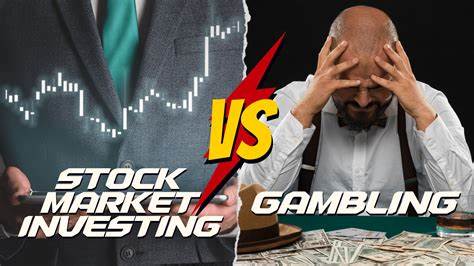Comparing Stock Market and Sports Betting: Insights for Jili777 Users
Stock Market vs. Sports Betting: A Comparative Analysis


The allure of financial gain has led individuals to explore various avenues, notably the stock market and sports betting. While both involve risk and the potential for profit, they differ significantly in structure, strategy, and long-term viability.
Understanding the Stock Market
The stock market is a platform where investors buy and sell shares of publicly held companies. Investing in stocks represents purchasing a fractional ownership in a company, with the expectation of earning returns through price appreciation and dividends. Key characteristics include:
Ownership Stake: Shareholders possess a claim on the company's assets and earnings.
Regulation: Subject to stringent regulations by government bodies (e.g., the U.S. Securities and Exchange Commission) to ensure transparency and protect investors.
Long-Term Growth: Historically, the stock market has provided average annual returns of approximately 10%, rewarding patient investors over extended periods.
Exploring Sports Betting
Sports betting involves wagering on the outcome of sports events, aiming to profit from correctly predicting results. Key aspects include:
Speculative Nature: Bets are placed on uncertain outcomes, with odds reflecting the perceived probability of various results.
Short-Term Focus: Outcomes are determined shortly after the event concludes, offering immediate results.
Entertainment Value: Often viewed as a form of entertainment, though it carries the risk of financial loss.
Comparative Analysis
Risk and Return:
Stock Market: Offers potential for steady, long-term growth, though subject to market volatility.
Sports Betting: Characterized by high risk, with the majority of bettors experiencing net losses. Money
Strategy and Skill:
Stock Market: Relies on fundamental analysis, market trends, and economic indicators.
Sports Betting: Involves analyzing team performance, player statistics, and other variables; however, outcomes remain unpredictable.
Regulatory Environment:
Stock Market: Heavily regulated to ensure fair practices and protect investors.
Sports Betting: Regulations vary by jurisdiction, with some regions imposing strict restrictions.
Financial Impact:
Stock Market: Can contribute to wealth accumulation and financial stability over time.
Sports Betting: Often leads to financial losses, with studies indicating that sports betting tends to reduce households' savings. NerdWallet: Finance smarter
Recent Developments
The lines between traditional investing and sports betting are increasingly blurring. Platforms like Kalshi offer prediction markets on sports events, allowing users to trade contracts based on outcomes. However, these platforms face regulatory scrutiny, with several U.S. states issuing cease-and-desist orders, questioning whether such activities fall under gambling regulations. Barron's+6Axios+6Barron's+6Barron's+3Barron's+3Axios+3Business Insider
Conclusion
While both the stock market and sports betting offer avenues for potential profit, they differ markedly in terms of strategy, risk, and long-term benefits. Investing in the stock market is generally considered a more stable approach to wealth accumulation, whereas sports betting carries significant risks and is often viewed as a form of entertainment rather than a reliable investment strategy



